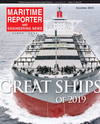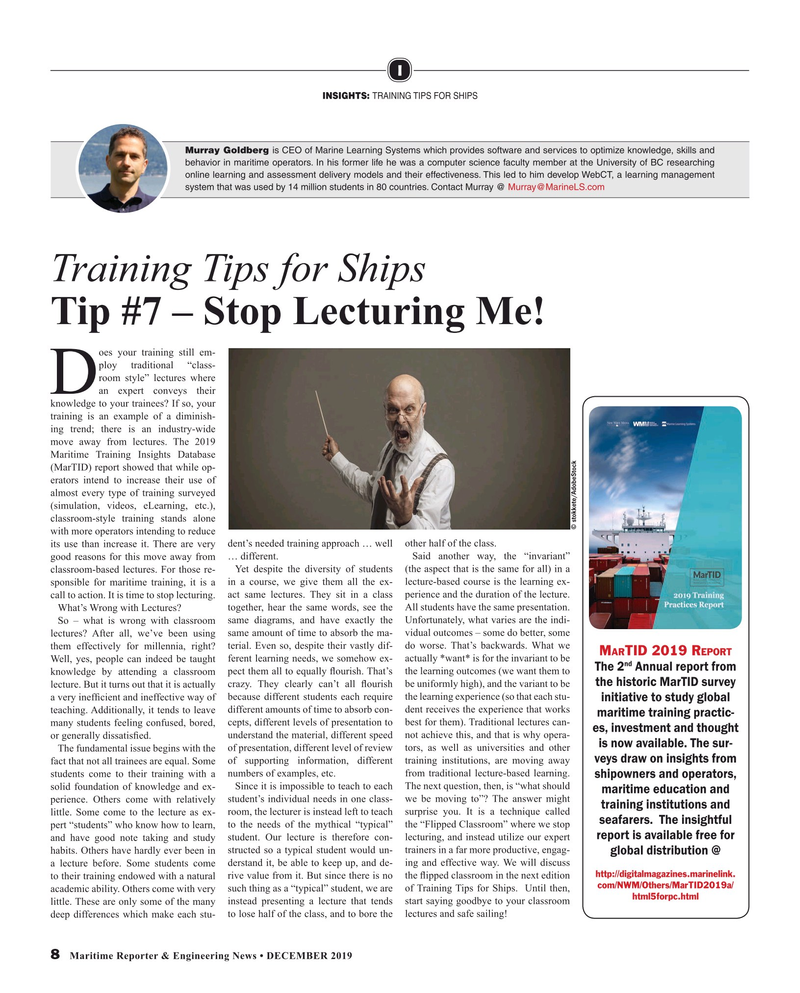
Page 8: of Maritime Reporter Magazine (December 2019)
Great Ships of 2019
Read this page in Pdf, Flash or Html5 edition of December 2019 Maritime Reporter Magazine
I
INSIGHTS: TRAINING TIPS FOR SHIPS
Murray Goldberg is CEO of Marine Learning Systems which provides software and services to optimize knowledge, skills and behavior in maritime operators. In his former life he was a computer science faculty member at the University of BC researching online learning and assessment delivery models and their effectiveness. This led to him develop WebCT, a learning management system that was used by 14 million students in 80 countries. Contact Murray @ [email protected]
Training Tips for Ships
Tip #7 – Stop Lecturing Me!
oes your training still em- ploy traditional “class- room style” lectures where
D an expert conveys their knowledge to your trainees? If so, your training is an example of a diminish- ing trend; there is an industry-wide move away from lectures. The 2019
Maritime Training Insights Database (MarTID) report showed that while op- erators intend to increase their use of almost every type of training surveyed (simulation, videos, eLearning, etc.), classroom-style training stands alone © stokkete/AdobeStock with more operators intending to reduce its use than increase it. There are very dent’s needed training approach … well other half of the class. good reasons for this move away from … different. Said another way, the “invariant” classroom-based lectures. For those re- Yet despite the diversity of students (the aspect that is the same for all) in a sponsible for maritime training, it is a in a course, we give them all the ex- lecture-based course is the learning ex- call to action. It is time to stop lecturing. act same lectures. They sit in a class perience and the duration of the lecture.
What’s Wrong with Lectures? together, hear the same words, see the All students have the same presentation.
So – what is wrong with classroom same diagrams, and have exactly the Unfortunately, what varies are the indi- lectures? After all, we’ve been using same amount of time to absorb the ma- vidual outcomes – some do better, some them effectively for millennia, right? terial. Even so, despite their vastly dif- do worse. That’s backwards. What we
M TID 2019 R AR EPORT
Well, yes, people can indeed be taught ferent learning needs, we somehow ex- actually *want* is for the invariant to be nd
The 2 Annual report from knowledge by attending a classroom pect them all to equally ? ourish. That’s the learning outcomes (we want them to the historic MarTID survey lecture. But it turns out that it is actually crazy. They clearly can’t all ? ourish be uniformly high), and the variant to be a very inef? cient and ineffective way of because different students each require the learning experience (so that each stu- initiative to study global teaching. Additionally, it tends to leave different amounts of time to absorb con- dent receives the experience that works maritime training practic- many students feeling confused, bored, cepts, different levels of presentation to best for them). Traditional lectures can- es, investment and thought or generally dissatis? ed. understand the material, different speed not achieve this, and that is why opera- is now available. The sur-
The fundamental issue begins with the of presentation, different level of review tors, as well as universities and other veys draw on insights from fact that not all trainees are equal. Some of supporting information, different training institutions, are moving away students come to their training with a numbers of examples, etc. from traditional lecture-based learning. shipowners and operators, solid foundation of knowledge and ex- Since it is impossible to teach to each The next question, then, is “what should maritime education and perience. Others come with relatively student’s individual needs in one class- we be moving to”? The answer might training institutions and little. Some come to the lecture as ex- room, the lecturer is instead left to teach surprise you. It is a technique called seafarers. The insightful pert “students” who know how to learn, to the needs of the mythical “typical” the “Flipped Classroom” where we stop report is available free for and have good note taking and study student. Our lecture is therefore con- lecturing, and instead utilize our expert habits. Others have hardly ever been in structed so a typical student would un- trainers in a far more productive, engag- global distribution @ a lecture before. Some students come derstand it, be able to keep up, and de- ing and effective way. We will discuss http://digitalmagazines.marinelink.
to their training endowed with a natural rive value from it. But since there is no the ? ipped classroom in the next edition com/NWM/Others/MarTID2019a/ academic ability. Others come with very such thing as a “typical” student, we are of Training Tips for Ships. Until then, html5forpc.html little. These are only some of the many instead presenting a lecture that tends start saying goodbye to your classroom deep differences which make each stu- to lose half of the class, and to bore the lectures and safe sailing!
8 Maritime Reporter & Engineering News • DECEMBER 2019
MR #12 (1-9).indd 8 12/9/2019 9:21:26 AM

 7
7

 9
9
